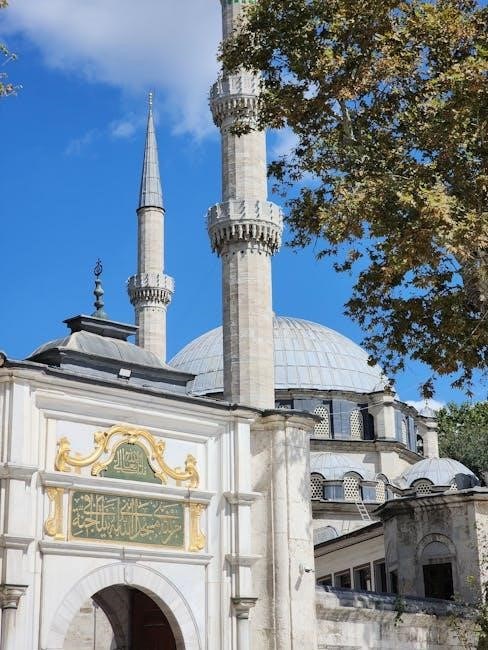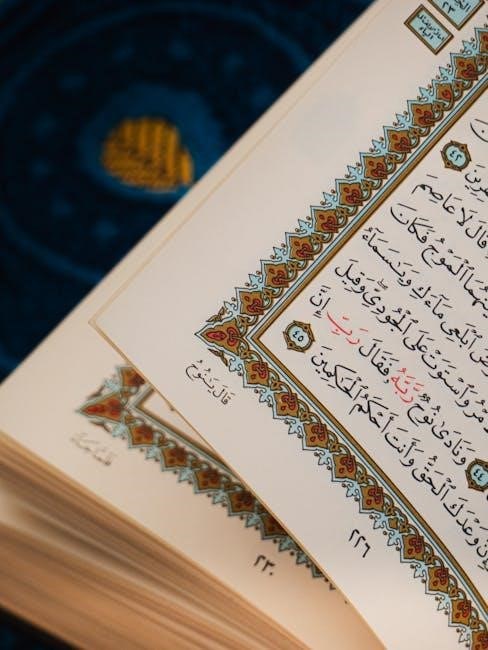The Modeh Ani prayer is a foundational Jewish morning prayer, expressing gratitude for the soul’s return․ Recited upon waking, it reflects faith in divine renewal and compassion, fostering mindfulness and thankfulness for life’s blessings․

Significance of the Modeh Ani Prayer in Jewish Liturgy
The Modeh Ani prayer holds profound significance in Jewish liturgy as the first prayer recited upon waking, expressing gratitude for the soul’s return․ It reflects faith in divine mercy and renewal, emphasizing God’s compassion in sustaining life․ This prayer sets a tone of mindfulness and thankfulness, fostering a spiritual connection from the start of the day․ Its brevity and depth make it a cornerstone of daily worship, reminding individuals of their dependence on divine grace․ Modeh Ani is not just a personal expression but a communal affirmation of trust in God’s faithfulness, resonating across generations and uniting Jews worldwide in shared devotion․
Overview of the Prayer’s Structure and Content
The Modeh Ani prayer is a concise yet profound expression of gratitude, structured to acknowledge divine benevolence․ It begins with the phrase “Modeh Ani Lefanecha,” translating to “I gratefully thank You,” addressing God as the “living and eternal King․” The prayer continues by recognizing God’s faithfulness in restoring the soul, emphasizing divine compassion and trustworthiness․ Key phrases like “Rabbah Emunatecha” highlight the abundance of God’s faith, a unique theological concept․ The prayer concludes with a reaffirmation of reliance on God’s mercy․ Its structure is simple yet rich in meaning, blending personal devotion with universal Jewish values․ Modeh Ani serves as a spiritual anchor, grounding the day in gratitude and faith, making it a beloved and enduring part of Jewish liturgical tradition․

Historical Background of the Modeh Ani Prayer
The Modeh Ani prayer has ancient roots in Jewish liturgy, evolving over centuries as a morning blessing expressing gratitude for life and divine renewal․
Origins and Development of the Prayer
The Modeh Ani prayer traces its origins to ancient Jewish liturgical traditions, emerging as a morning blessing to express gratitude for life’s renewal․ Its development reflects the Jewish community’s evolving spiritual practices, blending thanksgiving with acknowledgment of divine faithfulness․ The prayer’s core theme of soul restoration resonates deeply, emphasizing the belief in God’s daily renewal of life․ Over time, it has become a universal prayer, recited across diverse Jewish communities, fostering a sense of unity and shared faith․ Its concise yet profound wording captures the essence of Jewish spirituality, making it a cornerstone of daily devotion․ The prayer’s enduring relevance lies in its ability to inspire gratitude and humility, connecting believers to a higher purpose from the moment they awaken․
Evolution of the Prayer Throughout Jewish History
The Modeh Ani prayer has evolved over centuries, reflecting Jewish history’s spiritual and cultural shifts․ Originating in medieval times, it became a staple in morning liturgy, emphasizing gratitude for life’s renewal․ Mystical influences, particularly from Kabbalah, deepened its meaning, linking it to the soul’s divine connection․ Over time, the prayer’s phrasing remained largely unchanged, but its interpretation expanded to include themes of divine faithfulness and mercy․ In modern times, its universality has been reinforced, with translations and adaptations making it accessible to diverse Jewish communities․ The prayer’s enduring appeal lies in its ability to bridge tradition and contemporary spirituality, resonating with Jews across generations and backgrounds․ Its evolution underscores the dynamic nature of Jewish prayer, balancing continuity with meaningful reinterpretation․

Structure and Components of the Modeh Ani Prayer
The Modeh Ani prayer is a concise expression of gratitude, recited upon waking, thanking God for restoring the soul․ Its structure includes key phrases like “Rabbah Emunatecha,” emphasizing divine faithfulness and compassion, reflecting its brevity and profound meaning in daily Jewish practice․
Key Phrases and Their Meanings
The Modeh Ani prayer contains several key phrases that hold deep spiritual significance․ The opening phrase, “Modeh Ani L’fanecha,” translates to “I gratefully thank You,” expressing profound appreciation to God․ “Melech Chai V’kayam” acknowledges God as the eternal and ever-present ruler․ The phrase “Shehechezarta Bi Nishmati B’chemlah Rabah Emunatecha” highlights divine compassion and faithfulness in restoring the soul․ These words emphasize trust in God’s mercy and the recognition of life as a divine gift․ The prayer’s language underscores themes of gratitude, faith, and the recognition of God’s constant presence in daily life, making it a powerful start to the day․ Its concise yet meaningful structure ensures it resonates deeply with those who recite it, fostering a mindset of thankfulness and connection to the divine․
The Role of “Rabbah Emunatecha” in the Prayer

The phrase “Rabbah Emunatecha” is a pivotal element in the Modeh Ani prayer, signifying God’s abundant faithfulness and trust in humanity․ It reflects the divine promise of renewal and compassion, emphasizing that faith is not solely a human virtue but also a divine attribute․ This phrase underscores the belief that God’s faithfulness is unwavering, even as humans may falter․ By acknowledging “Rabbah Emunatecha,” the reciter affirms trust in God’s mercy and recognizes the divine hand in restoring the soul each morning․ This expression deepens the prayer’s emotional and theological resonance, fostering a sense of gratitude and connection to the divine․ It serves as a reminder of God’s constant presence and faithfulness in daily life, making it a cornerstone of the prayer’s meaning and impact․
Translation and Interpretation of the Prayer
The Modeh Ani prayer, translated as “I offer thanks before You, living and eternal King, for You have mercifully restored my soul within me,” expresses profound gratitude to God․ This short yet powerful prayer acknowledges divine compassion and the gift of life․ The phrase “living and eternal King” emphasizes God’s eternal and vibrant nature, while “mercifully restored my soul” highlights the belief in divine renewal each morning․ The prayer’s interpretation revolves around themes of thanksgiving, faith, and recognition of God’s mercy․ It serves as a daily affirmation of trust in divine providence and renewal, encouraging mindfulness and appreciation for the blessings of life․ This prayer is not just a ritual but a heartfelt expression of connection to the divine, fostering a sense of humility and joy in the morning․ Its simplicity belies its deep theological and emotional significance․
Theological and Philosophical Insights
The Modeh Ani prayer embodies deep theological themes, emphasizing divine mercy, renewal, and faith․ It reflects trust in God’s compassion and the belief in the soul’s daily restoration, fostering spiritual gratitude and mindfulness․
The Concept of Faith in the Modeh Ani Prayer
Faith is central to the Modeh Ani prayer, as it acknowledges divine trust and reliance․ The phrase “Rabbah Emunatecha” highlights God’s unwavering faithfulness, encouraging believers to trust in His mercy and providence․ This prayer underscores the Jewish belief in a personal, dynamic relationship with the Divine, where faith is not passive but an active expression of gratitude and surrender․ By reciting Modeh Ani, one reaffirms their trust in God’s daily renewal of life, reflecting a deep theological understanding of faith as a cornerstone of spiritual existence․ This emphasis on faith fosters resilience and hope, guiding individuals to approach life’s challenges with confidence in divine compassion and support․
Understanding Divine Mercy and Compassion
The Modeh Ani prayer profoundly reflects divine mercy and compassion, as it expresses gratitude for the soul’s daily renewal․ The phrase “Rabbah Emunatecha” underscores God’s faithfulness and trustworthiness, emphasizing His unwavering compassion․ By acknowledging divine mercy, the prayer fosters a deep sense of reliance on God’s kindness and providence․ This theological concept highlights the belief that every day is a gift from God, renewed with mercy and grace; The prayer encourages believers to trust in divine compassion, even amidst life’s challenges, and to approach each day with hope and resilience․ Through Modeh Ani, one connects with the divine, recognizing the infinite mercy that sustains life and spirit, and cultivates a heart of gratitude and faith․
The Significance of Gratitude in Jewish Thought
Gratitude is a cornerstone of Jewish spirituality, and the Modeh Ani prayer embodies this value․ By thanking God for the return of the soul, the prayer cultivates a mindset of appreciation for life’s blessings․ Jewish thought emphasizes gratitude as a means to connect with the divine and recognize God’s constant presence․ Modeh Ani teaches that every day is a new opportunity to express thanks, fostering humility and joy․ This prayer reflects the broader Jewish principle of acknowledging divine kindness in all aspects of life․ Gratitude is not just a ritual but a way of life, encouraging individuals to appreciate the small miracles and gifts they often take for granted․ Through Modeh Ani, gratitude becomes a daily practice that enriches one’s relationship with God and the world;

Practical Aspects of Reciting the Modeh Ani Prayer
Recite Modeh Ani immediately upon waking, before any other actions․ Thank God for restoring your soul, reflecting gratitude for life and divine compassion each morning․
When and How to Recite the Prayer
The Modeh Ani prayer is traditionally recited immediately upon waking, before any other actions or words․ It is said while still in bed, as a way to acknowledge divine renewal․ The prayer should be recited with proper intent and focus, reflecting gratitude for the return of one’s soul․ Many recite it aloud, while others whisper it, ensuring the words are meaningful․ The prayer is short, making it accessible for all, regardless of familiarity with Hebrew․ Its structure emphasizes faith and divine compassion, serving as a powerful start to the day․ By reciting Modeh Ani, one cultivates mindfulness and appreciation for life’s blessings, aligning with Jewish values of thankfulness and spiritual awareness․
The Importance of Proper Intent and Focus
Proper intent and focus are crucial when reciting the Modeh Ani prayer, as they enhance its spiritual significance․ The prayer is not merely a ritual but a heartfelt expression of gratitude and faith․ Reciting it with sincerity ensures that the words resonate deeply, fostering a meaningful connection with the divine․ Distractions should be minimized to maintain focus, allowing the individual to fully engage with the prayer’s message․ The emphasis on intent reflects the Jewish value of kavannah, or mindful prayer, which elevates the act beyond mere recitation․ By concentrating on the prayer’s meaning, one cultivates a deeper sense of gratitude and awareness of divine compassion․ This mindful approach transforms the prayer into a powerful tool for spiritual growth and renewal, aligning with its purpose of acknowledging life’s blessings․ Proper intent and focus thus enrich the prayer’s impact, making it a profound morning practice․
Common Customs and Practices Surrounding the Prayer
Reciting the Modeh Ani prayer is often accompanied by specific customs that enhance its meaning․ Many Jews recite it immediately upon waking, before getting out of bed, to acknowledge divine mercy․ The prayer is typically said with eyes closed to focus on its heartfelt message․ In some traditions, it is recited aloud in a group setting, fostering communal gratitude․ Parents often teach the prayer to young children, emphasizing its importance as a daily practice․ The prayer is also sometimes followed by a brief moment of silent reflection or by reciting additional blessings․ These customs highlight the prayer’s role in fostering mindfulness and gratitude, making it a cherished part of Jewish daily life and a meaningful way to begin the day with spiritual intention․
Cultural and Educational Impact
The Modeh Ani prayer deeply influences Jewish culture and education, fostering gratitude and faith․ It is often taught to children, emphasizing its significance in daily life and spiritual growth․
The Role of Modeh Ani in Jewish Education
The Modeh Ani prayer holds a significant place in Jewish education, particularly in teaching children the importance of gratitude and faith․ From a young age, children are encouraged to recite this prayer upon waking, fostering a sense of appreciation for life and divine providence․ It serves as a foundational lesson in cultivating mindfulness and acknowledging God’s presence in daily life․ The prayer is often incorporated into morning routines, helping children develop a positive outlook and a strong spiritual foundation․ By teaching Modeh Ani, educators instill timeless values of thankfulness and trust in God, which are central to Jewish faith and practice․ This practice not only shapes a child’s character but also strengthens their connection to Jewish heritage and tradition, ensuring its transmission to future generations․
Artistic and Literary Interpretations of the Prayer

The Modeh Ani prayer has inspired various artistic and literary works, reflecting its universal themes of gratitude and renewal․ Its concise yet profound language has been translated and interpreted in numerous ways, making it a subject of poetic and musical expression․ Many artists and writers draw inspiration from its emphasis on faith and divine mercy, incorporating its essence into their creations․ The prayer’s focus on mindfulness and thankfulness resonates deeply, transcending religious boundaries and appealing to a broader audience․ Literary works often explore its emotional and spiritual depth, while musical compositions bring its words to life through melody․ This prayer’s ability to evoke reflection and connection has made it a timeless source of inspiration in both Jewish and non-Jewish cultural contexts, enriching the spiritual and creative landscape․
The Modeh Ani prayer is a timeless expression of gratitude, faith, and renewal, offering a profound start to each day with its enduring message of divine compassion and thankfulness․
Final Thoughts on the Modeh Ani Prayer
The Modeh Ani prayer holds profound significance as a daily affirmation of gratitude and faith․ Its simple yet deeply meaningful words encapsulate the essence of Jewish spirituality, emphasizing trust in divine compassion and renewal․ By acknowledging God’s faithfulness in restoring the soul, the prayer fosters a mindset of appreciation and humility; It serves as a reminder of life’s preciousness and the importance of beginning each day with mindfulness and thankfulness․ The prayer’s universality and accessibility make it a cherished practice across Jewish communities, transcending age and circumstance․ Its theological depth, coupled with its simplicity, ensures its relevance for personal reflection and communal worship alike, inspiring individuals to embrace each day with renewed purpose and gratitude․
Encouragement to Explore and Engage with the Prayer
Exploring the Modeh Ani prayer offers a profound opportunity to deepen spiritual connection and cultivate gratitude․ Its concise yet meaningful words invite reflection on divine faithfulness and the gift of life․ By engaging with this prayer, individuals can foster a mindset of appreciation and humility, beginning each day with purpose and joy․ The prayer’s accessibility makes it a beautiful practice for all, regardless of familiarity with Jewish tradition․ Encouraging others to learn and recite Modeh Ani can inspire a sense of community and shared gratitude; Resources like the Modeh Ani prayer PDF provide a convenient way to study and incorporate this blessing into daily life, ensuring its timeless message continues to resonate with new generations․

